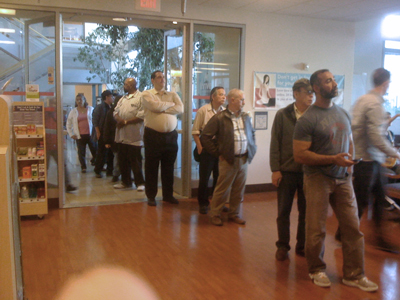Kaiser Health News has a good run down of the few provisions that kick in during 2011. For the insurance companies, the most important is that they will be required to spend 80 (or in some cases 85) percent of the premiums they take in on treatment for sick people. If the regulatory agencies are tough, this may be of benefit to people with insurance. Presumably the companies' most urgent efforts will be evading the new limits on their perks and profits.
The other big change will be that elders who find their prescription costs throw them into the uncovered (donut hole) part of Medicare's weird drug plan will be able to buy generic drugs at half price. If they can use generics. If they have the money. Seems kind of iffy to me, but AARP says it is a good thing, as are free annual physicals and some preventive screenings now included in Medicare.

Patients lined up to fill prescriptions at Kaiser facility.
Because I've been making too many doctor visits myself over the last few months, I've been thinking hard about another change in the health system -- the effort to encourage doctors and hospitals to adopt fully electronic medical records (EMR). The original stimulus bill included $20 billion to help doctors make the change and will penalize doctors still using paper in 2015 by cutting their Medicare and Medicaid rates. We can expect the Republican House of Representatives to obstruct any additional funding for this.
There is a lot of work to do. According to Ezra Klein,
I'm incredibly lucky; as a member of the Kaiser Permanente HMO, my records have long been fully computerized. Whether I'm seeing an ophthalmologist, a nurse practitioner for a PAP smear, or my regular doctor, she can look at my whole history right there on a screen. If I have failed to have needed shots or exams, all of them point this out. All of them can see immediately if I am taking any meds. No pharmacist is going to give me the wrong drug because she misread a doctor's scribbling. To me, all this seems very well and good.Half of all doctors [are] using electronic records, most of the rest considering it. ... There's an argument that we're eventually going to look back at the stimulus bill's investment in electronic medical records as the most important improvement the Obama administration made to the health-care delivery system -- and, if the more optimistic assessments are right, as a crucial piece of infrastructure that allowed us to eventually get costs under control.
But I decided to ask my doctors and doctor friends what they thought of these changes.
- One friend, a very conscientious doctor indeed, thinks EMR are a great idea. But she works for a system (not Kaiser) that expects her to transcribe historical patient data on her own time. She's doing it, but this looks like a place where that new federal money ought to go. The hospital system may think differently though, if they can get their doctor employees to do the work without pay.
- One provider explained to me that the electronic records are great, but patients complain that some doctors only look at the computer, never at them. The docs are more concerned with typing in the right data than interacting. Kaiser expects doctors to chart during the time allotted for the patient visit, a requirement that probably encourages this.
- One experienced doctor had an interesting observation: "they got rid of the people who filed and delivered the paper charts." This seems as if it would be a simple reallocation of low-skilled labor (most of these workers were found other clerical jobs in the system) but she experienced it as a loss of systemic knowledge. The chart department "knew" things about the interactions within the medical system that weren't understood anywhere else. That knowledge is gone, along with the paper.
No comments:
Post a Comment